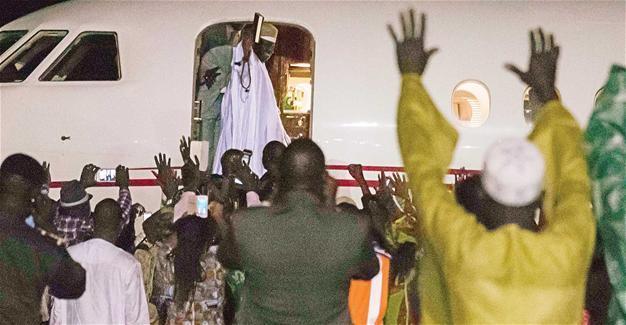Gambia’s Jammeh leaves power and country after 22 years
BANJUL
 Gambian leader Yahya Jammeh flew out late Jan. 21 from the country he ruled for 22 years to cede power to President Adama Barrow and end a political crisis.
Gambian leader Yahya Jammeh flew out late Jan. 21 from the country he ruled for 22 years to cede power to President Adama Barrow and end a political crisis.Jammeh refused to step down after a Dec. 1, 2016 election in which Barrow was declared the winner, triggering weeks of uncertainty that almost ended in a military intervention involving five other west African nations.
The longtime leader, wearing his habitual white flowing robes, waved to supporters before boarding a small, unmarked plane at Banjul airport alongside Guinea’s President Alpha Conde after two days of talks over a departure deal, according to AFP.
He landed in Conakry, Guinea’s capital but set off again for Equatorial Guinea, where he will remain in exile, the president of the Economic Community of West African States (ECOWAS), Marcel Alain de Souza, said at a Dakar press conference.
“No legislative measures” would be taken that would infringe the “dignity, security, safety and rights” of Jammeh or his family, ECOWAS said in a joint declaration with the African Union and United Nations.
Jammeh could return to The Gambia when he pleased, the statement added, and property “lawfully” belonging to him would not be seized.
Barrow, speaking to the Associated Press on Jan. 21 hours before Jammeh left the country, said that he would launch a truth and reconciliation commission to investigate the alleged human rights abuses of Jammeh’s 22-year regime.
“We aren’t talking about prosecution here. We are talking about getting a truth and reconciliation commission,” Barrow said. “Before you can act, you have to get the truth, to get the facts together.”
Jammeh finally said he would step aside in the early hours of Jan. 21 and hand power to Barrow, who has been in neighboring Senegal and was sworn in there at the Gambian Embassy on Jan. 19.
“I call on President Barrow to come in immediately and take over the supreme responsibility of president, head of state, commander in chief and first citizen of our republic,” Jammeh said, according to remarks read out on state television before he left the country.
It would be improper not to “sincerely wish him and his administration all the best,” he added.
Jammeh took power in a 1994 coup from the country’s only other president since independence from Britain, Dawda Jawara, making this The Gambia’s first democratic transition of power.
The choice of Equatorial Guinea for his exile helps ease concerns that Jammeh might interfere in his nation’s politics if he stayed in Guinea, whose border is not far from The Gambia’s eastern region.
Turkey welcomes Gambia’s new president
Meanwhile, Turkey has welcomed Barrow as the new president of Gambia on Jan. 21, after the political crisis ended peacefully.
“We welcome the transfer of power to Adama Barrow, who was elected as President of The Gambia as a result of the elections held on Dec. 1, 2016,” the Turkish Foreign Ministry said in a statement.
“We appreciate the prudent stance shown by the Gambian people during this period which helped to prevent instability in the country,” the statement read.
Turkey also highlighted that ECOWAS played an important role in the process when the country’s Jammeh had refused to leave office after the election defeat.
“The efforts of the mediation committee which is composed of regional leaders and established upon the initiative of the ECOWAS aiming to ensure transfer of power has set another concrete example for ‘finding African solutions for African problems,’” the statement added.
















